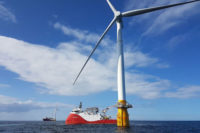With more focus on the energy “trilemma”—reliability, affordability and sustainability—since Russia’s Ukraine invasion upended global fossil fuel supply and transition, the annual CERAWeek by S&P Global energy sector conference in Houston earlier this month became a larger and more intense forum for debate by executives and policymakers.
This year’s event, which attracted a record 7,200 attendees, also was the first since passage of historic federal clean energy funding legislation—with more focus on how it could boost transition technology and on how traditional sources such as natural gas fit into the mix.
Noting what he termed the “urgent, growing, catastrophic set of [climate change] events unfolding,” Presidential Climate Envoy John Kerry asked oil and gas producers to “harness their technical skill” to invest in “low hanging fruit” such as operating efficiency and methane emissions cuts, particularly with boosted profits for most firms last year. “We need to not be polarized here, we need to collaborate,” he said.
To achieve energy transition on which "we’re already behind," Ken Gilmartin, CEO of Wood told attendees, "concentrated, concerted and collaborative action is needed.”
Project Permit Reform Restart
White House Energy Adviser John Podesta vowed renewed administration project permit reform efforts, but some speakers, such as Alaska Sen. Dan Sullivan (R) voiced concern that they could mostly or only favor renewables projects.
"If we're serious about accelerating the energy transition and building new kinds of projects at scale, we really need to take a hard look at the permitting process here in the U.S., and also in other parts of the world," said Brendan Bechtel, chairman and CEO of contractor Bechtel, in separate conference panel remarks. "To get new transmission lines permitted ... that connect new sources of clean power with their markets, it takes 14 years to get transmission lines permitted. This is just a huge opportunity to ... really focus on that affordability piece of the trilemma."
Republicans in the House on March 14 released details of permit reform legislation that combines several bills recently advanced by Republican-led committees and could gain House floor action by the end of the month. The bill would promote natural gas exports, codify changes made by the Trump Administrationin to speed NEPA environmental reviews, ease critical minerals development approvals and limit states from blocking energy projects by invoking provisions of the Clean Water Act.
The bill faces little chance of passage in the Democratic controlled Senate, with Majority Leader Charles Schumer calling it "something that falls pathetically short," but it is seen as a starting point for permit reform negotiations between the parties that also could expedite transmission expansion.
Permit reform has stalled since late last year when legislation pushed by Sen. Joe Manchin (D-W.Va.) failed to gain approval as an amendment to a defense spending bill. "I personally believe we are going to get permitting reform," said West Virginia Sen. Shelley Moore Capito, Senate Environment and Public Works Committee ranking Republican.
Meanwhile, some executives at the conference speculated on market limits for clean technologies, such as hydrogen. Chevron CEO Mike Wirth said “markets are better at sorting winners and losers than the government is.” Exxon Mobil CEO Darren Woods said new development incentives in the Inflation Reduction Act are “a good thing,” but noted that the market “and people’s willingness to pay a premium for low emissions fuels hasn’t taken off yet.”
Markets
Bechtel Energy President Paul Marsden said the firm is “seeing emerging markets in the U.S. for people who want to buy carbon dioxide as a feedstock for the synthesis of renewable fuels.” Growth could come as new technology reduces energy intensity in collecting carbon from waste streams, he said.
Trade groups from five states—West Virginia, Pennsylvania, Texas, New Mexico and Illinois—sent a joint appeal last week to US Environmental Protection Agency chief Michael Regan, seeking expedited action for states to be given regulatory control over so-called "Class VI" injection wells dedicated to permanent geologic CO2 injection. They see this as necessary to avoid delays under EPA in approvals for the wells' use in carbon capture and storage projects. Only North Dakota and Wyoming have state control over those wells. “Certainty and predictability are key factors businesses and producers need to make definitive investments in CCS technology," they said.
In energy conference comments, Regan said that while CCS "is a priority for this administration, we need to insure that injection wells don’t affect groundwater for communities. Technology must work well and for everyone."
In a conference session focused on emerging technologies for net zero, Wood's Gilmartin, told attendees that “investment in innovation and technology remains a priority and we’re excited about the technology to make carbon capture projects viable today." He said "it still comes down to the engineers needed – and we need to invest in the supply chain to continue developing the skills and talent to make net zero happen.”
Bechtel CEO Brendan Bechtel viewed energy transition “as the greatest opportunity of the century” for needed asset upgrade. But with industry costs "up 30% in the last quarter," tight labor availability and higher escalation rates for future construction, he said that "if you want to go do something big at scale and speed, early engagement and collaboration with your supply chain is important so we can be getting ready and making the investments for the future.”
Billions to Cut Industrial Emissions
Bechtel added that construction’s “next frontier, one that’s really hard, but we’re really committed to, is embodied carbon content, whether it’s reinforcing steel or structural steel and concrete.”
The U.S. Energy Dept. also announced during the event it would provide $6.3 billion from new federal funding laws toward efforts to decarbonize emissions-intensive industrial processes, with steel, cement and concrete production highlighted.
Grants and other funding will total up to 50% of the cost of first-of-a-kind or early-stage commercial-scale projects with significant decarbonization potential. About 65 projects are set to gain investment, the agency said. The administration also launched a push with 12 states committing to prioritize procurement of lower-carbon materials for state-funded infrastructure.
Noting cement producer decarbonizarion technologies such as lower-carbon cement blends, Portland Cement Association spokesman Sean O’Neill says the “focus on moving from demonstration projects to development could potentially have the biggest impact for our members.” Philip Bell, president of the Steel Manufacturers Association, says the funding would give American manufacturers a competitive advantage in the clean economy.
Initial concepts for funding are due to DOE by April 21 and full applications by Aug. 4.







Post a comment to this article
Report Abusive Comment